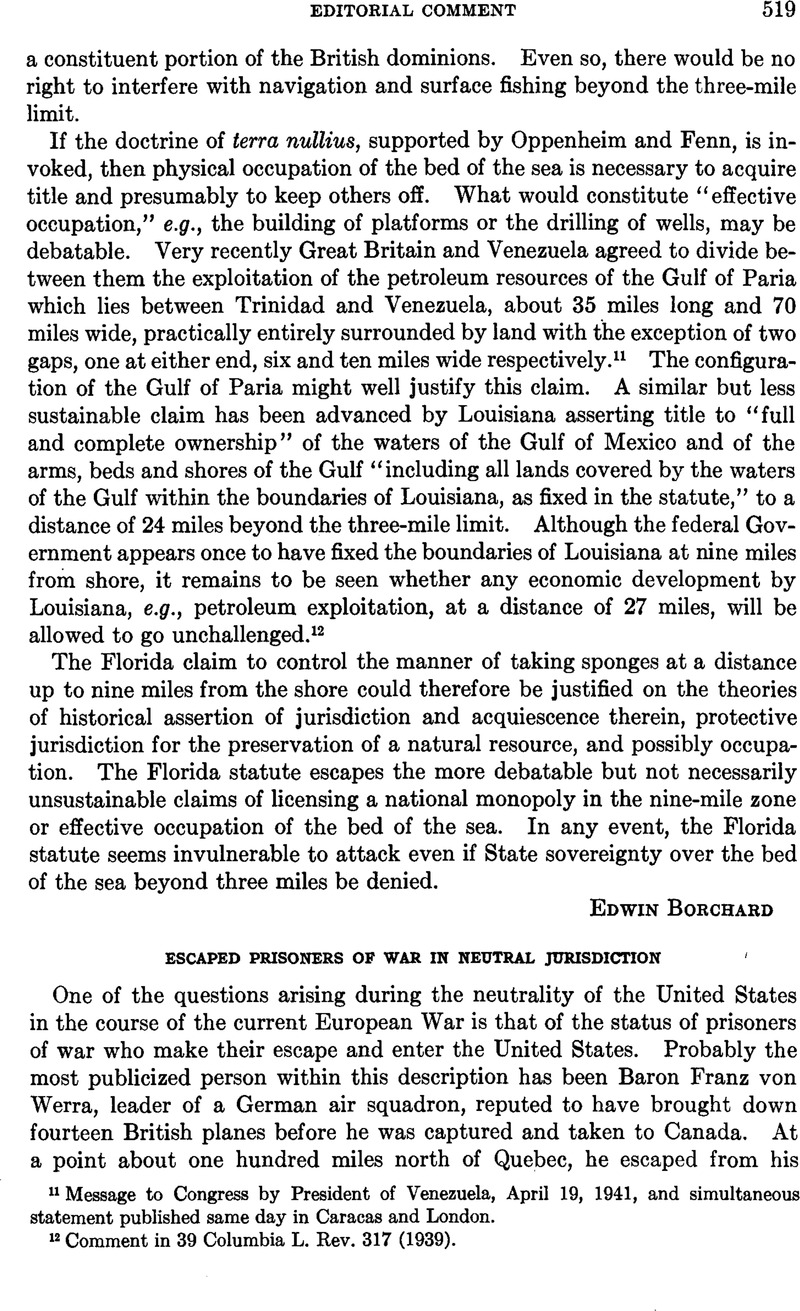Published online by Cambridge University Press: 12 April 2017

1 This brief statement of facts is based principally upon accounts in the New York Times, particularly the issues of January 25, 26, May 1, 3, 1941.
2 Cf. the statement of Mr. Secretary Hull before the Foreign Affairs Committee of the House of Representatives, as reproduced in Department of State Bulletin, Jan. 18, 1941, at p. 90, and in this Journal, infra, p. 540.
3 This leaves out of consideration the status of such a person as von Werra in South American countries to which he may have gone after leaving the United States.
4 Vattel, Droit des gens, liv. iii, ch. vii; Hall, International Law (7th ed.), p. 659.
5 Cayet, Chronologie Novenaire, Introduction, in Petitot, Mémoires (1823), Vol. XXXVIII, Pt. 1, pp. 407–409.
6 Revue de droit internatinal et de législation comparee, Vol. III (1871), pp. 357–358.
7 Cf. Bluntschli, Das moderne Völkerrecht (1872), p. 433: “Mir scheint, es kommen weniger noch die militärischen Anordnungen, als vielmehr die volkerrechtlichen Pflichten in Betracht.”
8 Actes de la conference de Bruxelks (1874), pp. 314, 318.
9 Annuaire, t. XXI, pp. 380, 382.
10 36 Stat., Pt. 2, pp. 2310, 2324–2325. Five delegations at The Hague had submitted proposals on the point, as follows: (French) “Les prisonniers qui, s’étant échappés du territoire du belligérent qui les retenait, arrivent dans un pays neutre, doivent y être laissés libres;” (British) “Les prisonniers qui, s’étant échappés du territoire du belligérant qui les retenait ou du territoire ennemi occupe par un belligérant, arrivent dans un pays neutre, doivent y être laissés libres;” (Swiss) “Les prisonniers qui, s’étant échappés du territoire du belligérant qui les retenait, arrivent dans un pays neutre, doivent y être laissés libre, si l’Etat neutre les reçoil et tolère leur séjour, ce qu’il n’est pas tenu de faire;” (Netherlands) “Les prisonniers qui, s’étant échappés du territoire du belligérant qui les retenait, arrivent dans un pays neutre, et ceux qui y arrivent comme prisonniers de guerre d’une force armée qui se réfugie sur le territoire neutre, doivent y être laissés libres;” (Belgian) “L’Etat neutre qui reçoit des prisonniers évadés ou amenés par des troupes se réfugiant sur son territoire, peut les laisser en liberté ou leur assigner une résidence.” Deuxième Conférence de la Paix, III, 262–263.
11 The United States and Germany are parties to Hague Convention V, but Great Britain and Canada are not. By Art. 20 of the instrument, it is not to apply unless all belligerents in a particular war are parties.
12 Armand du Payrat, Le prisonnier de guerre dans la guerre continentale (1910), pp. 437–438.
13 Cf. G. G. Wilson, Handbook (2nd ed., 1927), p. 270.
14 Kleen, Lois et usages de la neutralité (1898–1900), Vol. II, p. 26. Cf. Paul Heilborn, Rechte und Pflickten der neutralen Staaten (1888), pp. 32–34.
15 See, for example, Consultation no. 250 du dep. de just, et pol., du 9 fevrier 1917, Droit Fediral Suisse (ed. Walther Burckhardt, 1930), Vol. I, p. 69.
16 Sauser-Hall, G., “De l’internement des prisonniers de guerre,” Revue générale de droit international public, Vol. XIX (1912), pp. 40, 47 Google Scholar.
17 Fauchille, Traité de droit international public, Vol. II (1921), p. 684; Oppenheim, International Law (6th ed., 1940), Vol. II, pp. 580–581.
The British Manual of Military Law, 1914, contains the following provision at p. 311: “Prisoners of war who succeed in escaping into neutral territory regain their liberty, but they cannot claim to remain there. It rests with the neutral State whether it will grant or refuse them admission, and in the latter case, whether or not it will allow them to remain on its territory. If they are allowed to remain, the neutral State may compel them to make their residence in a specified locality.”
18 In the Catherine Elizabeth, 5 C. Rob. 232 (1804), Sir William Scott said that a ship’s master, being a prisoner of war, “had a perfect right to attempt to emancipate himself by seizing his own vessel.” In this instance the prisoner had seized the ship of the captor.
It is pertinent to note that by U. S. General Order No. 207 (July 3, 1863) “it is the duty of the prisoner to escape if able to do so.”
For references in this note the writer is indebted to Dr. W. E. S. Flory, whose dissertation on the subject of the development of international law relating to prisoners of war is in course of publication.
19 It is realized that there might be valid reasons for distinguishing those prisoners coming into neutral jurisdiction of their own accord from those who might be brought in by their captors, but even in the case of the latter internment would not seem to work undue hardship. Cf. du Payrat, op. cit., p. 437.
20 18 U. S. C. A. Sec. 37 (40 Stat. 223): “ . . . Whoever, within the jurisdiction of the United States and subject thereto, shall aid or entice any interned person to escape or attempt to escape from the jurisdiction of the United States, or from the limits of internment prescribed, shall be fined not more than $1,000 or imprisoned not more than one year, or both.” By the same section, the internment referred to is that “in accordance with the law of nations.”